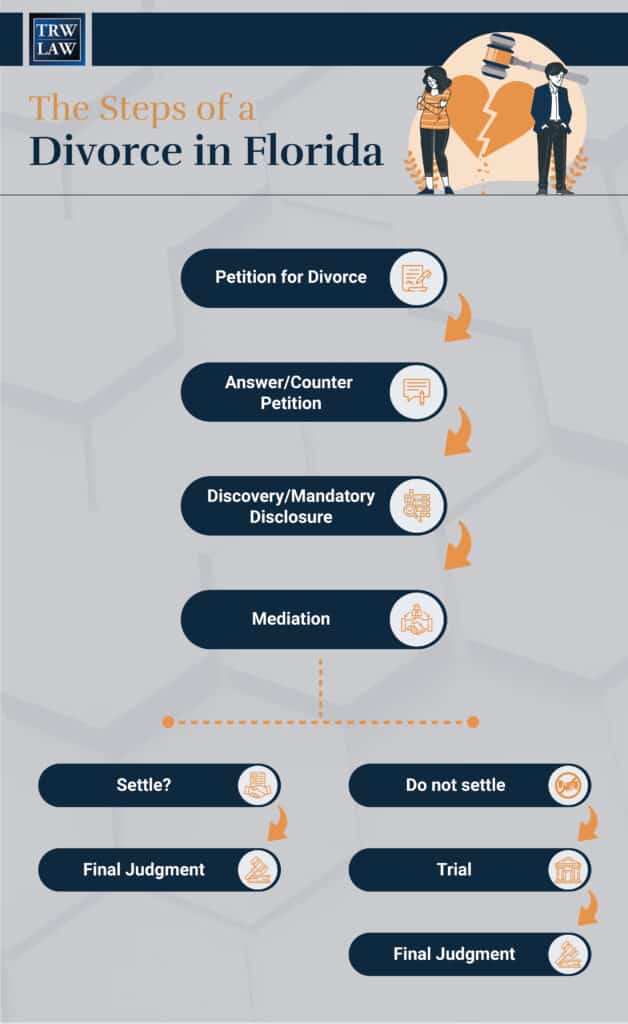- You or your spouse must live in Florida for at least six months before filing for a divorce.
- You may file for a simplified or regular dissolution of marriage.
- You may need to submit additional documents, including a parenting plan or financial information, with a divorce petition.
- The mediation process can help resolve outstanding divorce issues in lieu of a trial.
- A judge finalizes a divorce during a final hearing.
The dissolution of a marriage can be complicated because the laws governing the divorce process vary by state. If you’re seeking a divorce in Florida, we can explain the steps involved. If there are no minor children, the couple is not pregnant, and they agree on the property division, they may qualify for a Simplified Dissolution of Marriage. Couples who don’t meet those qualifications must follow these steps to file a Regular Dissolution of Marriage.
The 7 Steps To Get a Divorce in Florida
Regardless of whether you and your spouse fully agree to the divorce terms or have some issues to resolve, you’ll have to complete several steps before finalizing your marriage’s dissolution. Here are the seven steps for divorce in Florida and what you can expect during each one.
- Step 1: One Spouse Files a Petition
- Step 2: The Other Spouse Must File an Answer
- Step 3: Additional Paperwork Is Required
- Step 4: Discovery Reveals Financial Details
- Step 5: Mediation Helps Work Out the Details
- Step 6: A Parenting Plan Is Created
- Step 7: A Judge Finalizes the Divorce

Step 1: One Spouse Files a Petition
The Florida divorce process begins when one spouse files a petition for dissolution of the marriage. The petition falls into one of two categories: a regular or simplified dissolution of marriage. A regular petition for divorce is appropriate when the spouses share children and property or when there are matters to resolve. Couples may qualify for a simplified petition if they have no outstanding issues and don’t share property or children.
The petition must state that the marriage is irretrievably broken and outline different aspects of what the petitioner wants, such as primary parental responsibility over young children, alimony, or child support. The individual who files the initial petition is called “the petitioner” in all future legal divorce communications.
The petitioner files the divorce petition with their local circuit court clerk. The petitioner must ensure their spouse receives proper notice of the petition through personal or constructive service.
Step 2: The Other Spouse Must File an Answer
After your spouse receives the petition, they have 20 days to file an answer. If they don’t respond, the petitioner can file a motion for default and request a final hearing to approve all items requested in the initial divorce petition.
If your spouse files an answer to the petition, the document can take one of two forms: contested or uncontested. A contested answer means that your spouse disagrees with some or all of the requests and information provided in the petition. An uncontested petition indicates that your spouse agrees with all of the petition’s information. If the divorce is contested, you and your spouse can attempt to settle disagreements through mediation. Otherwise, the case will go to trial.
During the answer phase, either spouse may request certain protections or orders. Examples of temporary orders may include child custody or child and spousal support. If the court grants an order, it remains in effect until the divorce is finalized.
Step 3: Additional Paperwork Is Required
You must submit additional forms concerning your financial status, child support, and parenting plans. According to Florida law divorce law, these forms may be required depending on your situation:
- Uniform Child Custody Jurisdiction and Enforcement Act Affidavit: If you share minor children with your spouse, you must complete the UCCJEA affidavit. It provides basic information about the children, including their residence for the past five years and any existing child support or custody orders.
- Child Support Guidelines Worksheet: Spouses requesting court-ordered child support must submit the guidelines worksheet.
- Family Law Financial Affidavit: The Family Law Financial Affidavit outlines both spouses’ financial status, including income, expenses, assets, and debts. It helps the court determine the appropriate amounts for child support, alimony, and property division.
- Certificate of Compliance with Mandatory Disclosure: This form provides both parties’ consent to provide documentary financial information, including tax returns, pay stubs, property deeds, bank statements, and brokerage account details. It must be submitted within 45 days from the date of service on the spouse respondent.
Step 4: Discovery Reveals Financial Details
During this step, both spouses provide their financial details, including bank statements, tax returns, and pay stubs. Lawyers may request additional financial information based on their client’s circumstances. For instance, if one party owns real estate, they may request a copy of the property deed or a recent tax assessment.
Additional information about each spouse’s financial circumstances helps the attorneys determine fair alimony, child support payments, and potential property divisions. Such details can aid the mediation process when both parties attempt to arrive at a reasonable divorce settlement and avoid trial.
Step 5: Mediation Helps Work Out the Details
Most Florida spouses hope to avoid a divorce trial because it puts their contentious issues, including child support, parenting, alimony, and property division, in a judge’s hands. The mediation process helps both spouses reach a fair settlement on all matters so they can finalize their divorce and begin rebuilding their lives.
Mediation may be court-ordered, or your attorney may recommend it to avoid a trial. Mediation can occur in your lawyer’s office or another neutral location where you, your spouse, the mediator, and your legal representatives meet to craft an agreement. Through mediation, you and your spouse can work to overcome communication obstacles and settle any outstanding differences.
Step 6: A Parenting Plan Is Created
Often, custody of children becomes one of the most hotly contested issues in a Florida divorce. Parents may disagree about custody, time-sharing arrangements, and other parenting responsibilities. Mediation can help resolve issues and generate an agreed-upon parenting plan submitted to the court before the final hearing.
In addition to developing a parenting plan, both spouses must complete a parenting class. Your local county clerk or family law attorney can recommend court-approved parenting courses that meet Florida requirements.
Step 7: A Judge Finalizes the Divorce
If you and your spouse successfully negotiate a settlement, you will proceed to a final hearing, where a judge reviews all the paperwork, listens to testimony from both sides, and signs off on the divorce. If there are still unresolved matters you could not negotiate during mediation, the case will go to trial.
A divorce trial can be emotional and stressful for both parties. However, if settlement isn’t an option, a judge may need to resolve any contentious issues before finalizing the result. If you have a contested divorce, securing legal representation from a skilled attorney who can advocate for your interests is vital.
Residency Requirements
Filing for divorce in Florida requires you or your spouse to meet residency requirements. At least one of you must have lived in Florida for at least six months before filing a petition. To prove your residency, you must provide a copy of a valid Florida driver’s license, identification card, or voter’s registration.
Types of Divorce in Florida
Two primary types of divorce are available in Florida: simplified or regular dissolution of marriage.
A simplified dissolution of marriage applies to couples who have no marital assets or liabilities. There are no minor children, and neither spouse is pregnant or seeking alimony or spousal support.
A regular marriage dissolution applies to couples who share children or marital assets. Some couples may file for a regular marriage dissolution if they seek spousal support or want to preserve legal rights on certain matters.
The Law Offices of Travis Walker PA’s Experience in Divorce Cases
The skilled divorce lawyers at The Law Offices of Travis R. Walker, P.A., regularly assist clients in both uncontested and contested divorces. We also provide divorce enforcement support and mediation services.
Our firm is committed to the local Florida community and regularly participates in various initiatives and organizations, including the St. Lucie County Economic Development Council and the Hibiscus Children’s Center. We believe in lending our support wherever possible.
Call us at 772-732-2552 or complete our online form to schedule a divorce consultation.
Client Reviews
We have helped hundreds of clients work through difficult and complex divorce cases. Here are some samples of testimonials from our satisfied clients:
Hena Rodely was my personal divorce attorney with The Law Offices of Travis R. Walker. Hena was assertive and aggressive with fighting for my rights as a parent. Hena was so easy to communicate with and always available if I had questions for the next step. I highly recommend Hena as the attorney that defends your right to a fair divorce. Even when I wanted to cave to some of my rights as a father, Hena would redirect me into fighting for what is right for my situation. Thank you, Hena Rodely and The Law Offices of Travis R. Walker, for honoring my right to divorce with dignity.
– Daniel F.Travis and his team are very professional and responsive! UPDATE: 10/25/2023 After a few months of hard work and dedication from Travis and his team, I left mediation today with a very favorable outcome! One that even the mediator himself was surprised to have experienced. I can finally move forward with my life and my business, thanks to all of them! I HIGHLY recommend Travis and his team for all of your legal needs!
– Andrew S.Travis Walker's knowledge of the law is outstanding. His mannerism is extraordinary. I applaud Mr. Walker for his compassion and understanding when it comes to handling the sensitive nature of family cases. His ability to keep me centered and focused during a very emotional time was impressive. I highly recommend him and his courteous, capable, and helpful staff.
– Kay D.Our Florida Divorce Lawyers








